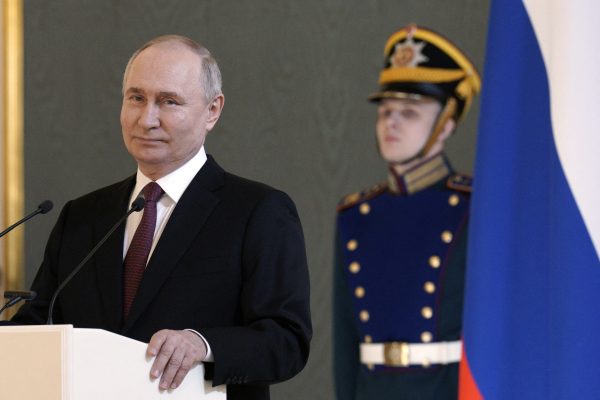According to a widely accepted script, next year’s French presidential election was to be a little frightening, but essentially benign. The far-right, gathered under the banner of Marine Le Pen, would present the only credible anti-Emmanuel Macron candidate and would probably lose. A repeat of 2017, in effect.
But of course, history never repeats itself quite so slavishly. The expected course of events is often upended by the unexpected, a role being played this time by Éric Zemmour, an outspoken TV talk show host and best-selling essayist with convictions for racial incitement and a fondness for references to an impending race war.
His rise in the opinion polls has been impressive– last week he overtook Le Pen for the first time. While Zemmour has not yet even announced his candidacy and the polls continue to show Macron winning the two-stage vote in April next year, the arrival of a disruptor brings uncertainty to the race.
Such volatility in public sentiment risks the unforeseen (Le Pen having taken the polling lead on multiple occasions, as recently as June 2021.) The Fifth Republic is under assault, as the continuing popularity of far-right populist candidates indicates. This is more profound than simply the ripples of the Covid-19 pandemic; it relates to the distrust of a large segment of the population toward their government. Though Macron currently enjoys first-round support of about 24% – beating Le Pen and Zemmour, who are both in the mid-teens – his popularity remains low, with just a 43% approval rating.
Several factors have led to Macron’s popularity decline. Most notable is his inability to connect with ordinary citizens and resultant political missteps, such as policies that sparked the Yellow Vest movement and the transportation pension strike, as well as his response to the pandemic. In addition, now that Macron is the incumbent, he is no longer the shiny new candidate he was in 2017. Voters will vote based on his record, as opposed to simply his campaign promises.
Le Pen, meanwhile, appears to have gambled by moving away from the radical far-right positions she previously embraced. For instance, she changed the name of her political party to distance herself from her extremist predecessor and father and abandoned radical plans to leave the European Union (EU) Additionally, she has benefited from Macron’s poor response to the pandemic, focusing her populist rhetoric on the government’s alleged failures (“they knew, they lied,” as her publicity puts it.)
That shift to the center ground has of course has opened her to being outflanked from the right. The gamble was that no sufficiently appealing candidate would appear, a bet that she lost with Zemmour’s challenge. With a portion of Le Pen’s supporters alienated by her gradual political shift and seeking a more hardline candidate — particularly on immigration — many have turned to the more radical option. And radical he is, talking of a civil war with Muslims (some 6m people, or less than 10% of the population) that is already underway, radical enough for Marine Le Pen’s father, Jean-Marie, to indicate that he might support the insurgent should he be better positioned to win than his daughter.
And yet. Should he run, the Algerian-born Jewish Berber candidate would face an uphill battle. He would be a first-time candidate with more extreme views than Le Pen, no experience running a top-level national campaign, and an urgent need to develop a full range of policies in a very short time. Anti-immigration rhetoric is popular with a small section of the electorate, but it has never yet amounted to a popular presidential platform. For now, at least, Le Pen is the right’s most popular and experienced candidate, and therefore still most likely to challenge Macron in the spring. Yet this comes with a caveat. Right now, the only certainty is uncertainty.
There is one other tantalizing possibility — that the two far-right candidates floor each other in the first round and open the way for Xavier Bertrand, the probable candidate for the traditional right-of-center party, Les Républicains, and a former minister under President Nicolas Sarkozy. That is far from the likeliest option, but there are some possibilities that would warm hearts in the US and Germany.
From the perspective of France’s European and North American allies, this is a difficult contest to watch. The impact of a President Le Pen on France, Europe, and the transatlantic alliance would be significant, despite the moderation of her policies and rhetoric. Most notably, Le Pen is not one for international cooperation, expressing disdain for international organizations such as the International Monetary Fund (IMF.) She is also vehemently anti-NATO, having called for France to leave the integrated command as it did in 1966. Zemmour, referred to by one political scientist as “the intellectual Trump,” is likewise anti-alliance. Clearly, if either were elected, they would test US-French relations.
Even if a far-right candidate does not win, France is not feeling well-disposed towards the alliance at the moment. With a long history of advocating greater European military autonomy, a continuing grievance over the way it was treated by Anglosphere countries during the gestation of the Aukus agreement, and the messy Western departure from Afghanistan, Macron has already indicated his disillusionment with the organization.
Any election outcome is therefore problematic from the US point of view. It may either produce Macron, who aligns with many values of the Biden administration but increasingly distrusts the US, or a leader – a Le Pen, or perhaps a Zemmour – who diverges greatly from much of the mission and values of the transatlantic alliance. No currently viable French presidential candidate sets the stage for smooth relations.
Fiona Noonan is a Transatlantic Leadership Intern at the Center for European Policy Analysis;
François Venne is a Title VIII Fellow at the Center for European Policy Analysis.




